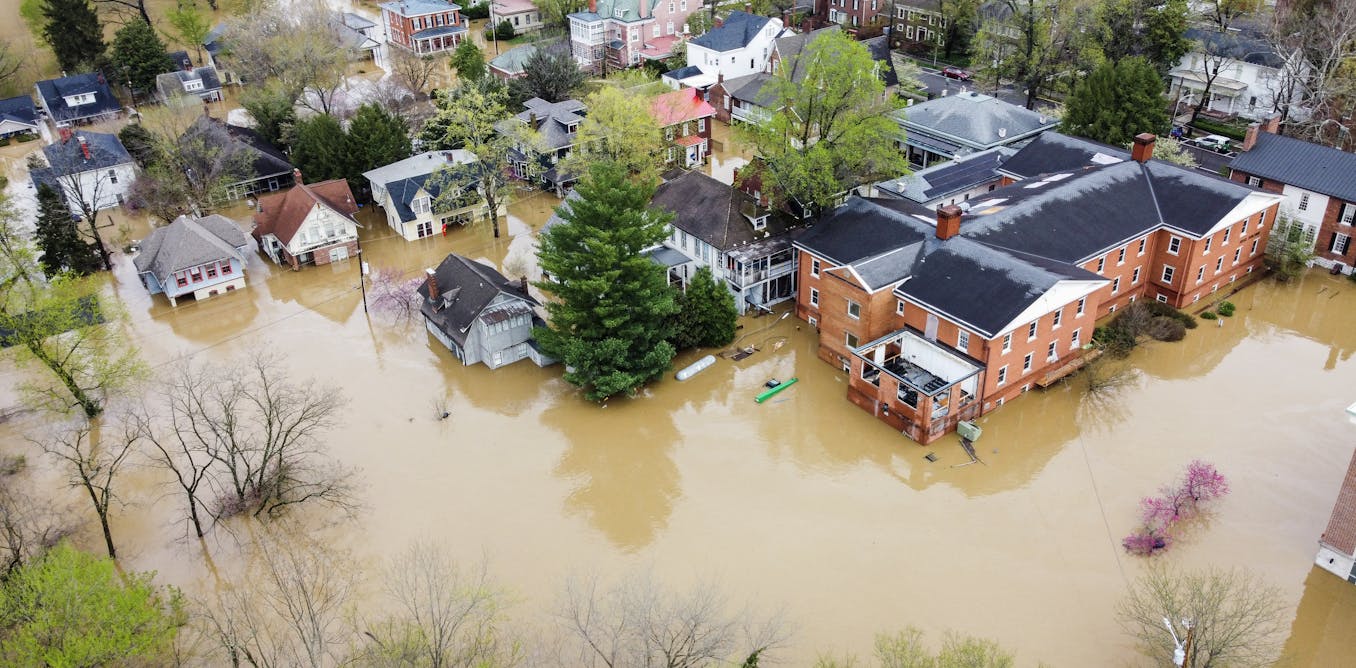When the parents of Michigan school shooter Ethan Crumbley were convicted of involuntary manslaughter, it was a watershed moment in US school shooting cases. It was also a key moment in parental culpability law, governing cases in which parents can be held legally responsible for the actions of their children.
Ethan Crumbley, who at age 15 brought a gun to his high school and killed four people and injured seven, pleaded guilty to 24 crimes at his own trial in 2022. But for the first time in American history, a school shooter’s parents were also convicted, of involuntary manslaughter, and sentenced to prison terms.
States have a variety of laws that hold parents responsible for youth offenses under what are called parental culpability laws. Most of these cases involve lower-level matters such as skipping school or damaging property, says developmental psychologist Colleen Sbeglia.
A doctoral candidate at the University of California, Irvine, Sbeglia was lead author of a paper in the Annual Review of Criminology that examines the wide range of behaviors covered by parental culpability laws and whether the laws work as intended. She spoke with Knowable Magazine about the laws — and the surprisingly small amount of research on their effectiveness.
This interview has been edited for length and clarity.
What’s significant about the criminal convictions for Ethan Crumbley’s parents?
Criminal charges have never been brought against the parents of a school shooter — or at least, not successfully. So this is really the first time we’re seeing this in American history.
Now that there’s precedent, is it possible we’ll start to see more cases where the parents of school shooters are held criminally accountable?
It is possible. If there’s precedent for something, that helps you build a case for doing the same thing again in the future. But with this particular case, there was so much verifiable, documented evidence of negligence that made it pretty unique. It will be important to watch and see what happens in the future.
How severe do the circumstances have to be, in order for parents to get criminally charged?
The bar is extremely high. You have to prove negligence, which in many cases is difficult. And you also have to be able to somehow disentangle the actions of the perpetrator — in these cases, the child — from the actions of the parents, which is normally kind of impossible to do.
Especially if we start thinking about teenagers, 16 to 17 years old, how much can their parents really control their behavior? That’s something that’s hard to prove definitively in court. Parents are important: They can try to do as much as they can and should be involved as much as they can. But at the end of the day, kids can become pretty independent by their mid-teens.
I think part of the reason why prosecutors were able to successfully bring charges against the parents in the Ethan Crumbley case is because there were so many text messages and records of ignored calls and documented instances of negligence.
Aside from these criminal charges for a school shooting, there’s a whole range of civil charges that can be brought against parents for much smaller stuff that their kids do wrong. What do those cases look like?
Two other broad categories come up much more frequently. If a kid damages some type of property, parents are going to be responsible for financial restitution. Kids don’t have jobs; they’re not able to pay, so the parents are on the hook for that. Civil liability can also include personal injury. If a kid causes a car accident, then the parents can be on the hook for the damage to the vehicle, but they may also have to pay for the personal injury damages.
The other big category is status offenses: behaviors that are illegal only because the youth is under 18. That includes things like underage drinking, truancy — not attending school — or violating curfew.
What’s the typical penalty for parents in a status offense case?
There are different laws by state, so it varies, but a lot of times it’s fines: Parents have to pay a certain amount, which is supposed to encourage them to monitor their kids more closely. Though it’s much more rare, the penalties in some states can be up to incarceration, or eviction, or parents having driver’s licenses taken away. These are obviously more extreme cases, but in some states it could, in theory, lead to that.
Why do we have these laws? What was the thinking behind putting these laws in place?
In the thinking behind any laws that we have, the goals are sort of twofold. One is to restore justice to the victim of the crime. And the other one is either to deter people from committing a crime in the first place or to stop them from committing a crime again.
With parental culpability laws, if the kid hurts someone or damages some property, you’d be able to restore something to the victim. But the other piece, this deterrence piece, implies that if these laws exist, then maybe parents will more closely monitor their children and try to control their behavior better. Or that if their kid does get in trouble, there’s consequences on the parents so they’ll change their behavior to become “better parents.”
But the problem is, we just don’t know if the laws have that deterrent effect. They might, but we do not know.
Why do we know so little about whether these laws help prevent juvenile crime?
There’s a lack of research. Originally, when we were writing our review, we planned to survey the research on the effects of parental culpability sanctions. And then we realized, “Oh, we don’t have much to write about.”
Why? Why is there so little research on this?
I think part of it is because, the way that counties keep records, it’s difficult to know how often these parental culpability charges are really pursued. All 50 states have property damage and restitution laws, and all 50 states have status offenses like truancy. But the charges can be pursued differently based on demographic factors, like race, and location.
And sometimes cases may come up that involve parental responsibility — such as someone suing a parent — that don’t follow the pattern of the government pursuing charges based on parental responsibility laws.
And then there can be different definitions of how things are measured. Like truancy, for example. When Kamala Harris was district attorney in San Francisco, she fought for strict truancy laws at one point. She wanted truancy to be defined as kids missing more than 10 percent of school days. So for a while, truancy was defined that way, but before that, it was just defined as “excessive absenteeism,” which is not a strict standard.
So what you are saying is that, for an academic studying this, getting one-to-one comparisons across states or jurisdictions could be really hard.
Yes. And another reason why there is a lack of research is that when we implement laws, for better or for worse they don’t automatically come with a study to see how effective they are.
So we don’t have much direct research on this question. But there are some real-life examples of consequences of really strict parental culpability laws.
Going back to the Kamala Harris example, not only did she push for a stricter truancy standard in San Francisco, when she became the attorney general for the state of California, she championed a law that made that the standard statewide. And the penalties on parents if their kids had too many unexcused absences could include fines or even jail time. This is maybe a good idea in theory: making a clear definition of truancy, making it consistent statewide, and being clear and consistent about the punishment that people can expect if kids don’t go to school. It would make it easier to research, too.
But there were a lot of unintended consequences here. Soon after the law went into effect, there was a single mother in Orange County in Southern California who was arrested and perp-walked for having her child miss more than 10 percent of the school days. But it turns out her child had sickle cell anemia and was missing school for medical appointments. Now, the mom and the school had not fully worked out the accommodation plan yet. But this is a single mom who has a child with an extreme medical condition and is facing lots of medical bills, and she got arrested and it was very publicized on television. Nowadays, Kamala Harris is trying to promote data-driven policies instead, and trying to understand the reasons why kids miss school, instead of just punishing parents.
And do status cases, such as truancy, happen often? What’s the scale of this issue?
In writing the review, I found that roughly speaking, there’s on average around 100,000 status offense cases that are filed in the United States every year.
You mentioned the mother in Orange County who was arrested. Could lesser penalties, such as a fine, cause hardship too?
Yes. If you think, for example, about a single mother who is socioeconomically disadvantaged, may have multiple children, and may be working multiple jobs, it can be very difficult for her to have the time and the resources to help her child do what they need to do.
Suppose it comes out that one of her sons hasn’t been going to school. If she has to pay a fine of several hundred dollars, she may have to pick up extra shifts at work to deal with this unexpected expense, which further limits her ability to monitor her son’s behavior. And it’s also possible that it is weakening their bond, because of course he’s doing something that he shouldn’t be doing and is causing his mother financial stress. And that can deteriorate the warmth in their relationship.
And there is research showing that having a warm relationship with your mother can help to prevent delinquency. A study published in 2017 followed 317 mothers and their teenage sons over two and a half years. The sons had just been arrested for the first time when the study started, and interviews over the study period showed that a high-quality mother-son relationship reduced youths’ reoffending over time.
There’s also research showing that being socioeconomically disadvantaged is a risk factor for adolescents engaging in delinquent behavior. And if parents have to pay fines, if they have to take time away from work to go in and attend hearings, the time and money can add up.
So perhaps these penalties could be counterproductive?
There isn’t much research on this, so we don’t know for sure. But we do know that these penalties on parents can contribute to all these other factors — such as financial hardship and family bonds — that are linked to juvenile crime.
What are the next steps for researchers and policymakers interested in this issue?
First and most obviously, it would be good to be able to measure the effect that these laws have. Are they having the desired effect — that after kids get in trouble, they don’t get in trouble again? Or if the parent has to pay fines or face some other consequence, is that actually related to a change in their parenting behavior? We know that if parents are more involved, and they are monitoring their children, that is linked to lower delinquency. But we don’t know if laws are making that change in parents.
But I would say the biggest avenue for future research, based on what we know about adolescent development, is whether support for parents and families is more effective at preventing or reducing crime than parental responsibility laws. Getting someone involved in the legal system does not necessarily address why the behavior happened. I think it’s important to remember that, especially when it comes to kids, the root of the problem is not necessarily criminal in nature.
More often than not, it’s a social problem: It could be because they don’t have a good neighborhood, or they are with other peers who are engaging in risky behaviors or who are involved in gangs. They might not have strong ties with their parents, maybe because their parents are working long hours or multiple jobs.
And on top of this, speaking in terms of their psychological development, teens are really wanting to seek out exciting things, and they’re not very good at controlling their impulses. Across the globe, risk-taking and offending behavior peaks during the teenage years, but almost all youth, even ones who commit serious crimes, stop offending as adults.
And so I think for the future, it’s also important to remember that the legal system is not the only tool that we have to address societal problems, especially when the root of these types of problems is often social in nature.
Why is it so important for there to be more research on these questions?
The Ethan Crumbley case is particularly horrible, but it is very rare and does not represent the majority of cases where parents will face legal culpability. We don’t know what the effects of parental culpability laws are on juvenile offending, but we do know that there could be many unintended consequences of parental culpability laws that have the potential to make juvenile crime worse.
So doing the research and actually evaluating things empirically is really important, because that can help us design better policies that do the most good, while limiting harm as much as possible.
This article When are parents responsible for their kids’ behavior? is featured on Big Think.

The post “When are parents responsible for their kids’ behavior?” by Elise Hansen was published on 06/19/2024 by bigthink.com
















![Animals vs. Water: Hilarious Moments! 😂 [2025 Edition] – Video Animals vs. Water: Hilarious Moments! 😂 [2025 Edition] – Video](https://i.ytimg.com/vi/F1_AvAuQI5M/maxresdefault.jpg)

















